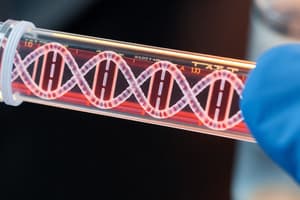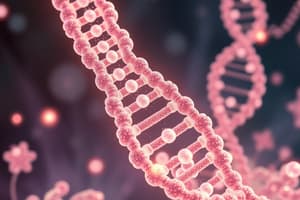Podcast
Questions and Answers
What is the primary role of primers in a PCR reaction?
What is the primary role of primers in a PCR reaction?
- To provide a starting point for DNA synthesis (correct)
- To help denature the DNA double helix
- To maintain optimal pH levels
- To synthesize new DNA strands
What temperature range is typically used for the denaturation step in PCR?
What temperature range is typically used for the denaturation step in PCR?
- 94-98°C (correct)
- 30-40°C
- 50-65°C
- 72-75°C
Which of the following is NOT a component required for a PCR reaction?
Which of the following is NOT a component required for a PCR reaction?
- DNA Template
- Buffer Solution
- RNA Primer (correct)
- Taq Polymerase
What is a significant limitation of PCR related to contamination?
What is a significant limitation of PCR related to contamination?
Which type of DNA library includes only expressed genes?
Which type of DNA library includes only expressed genes?
Why is Taq polymerase particularly suitable for PCR?
Why is Taq polymerase particularly suitable for PCR?
In which application is PCR primarily used for detecting pathogens in clinical samples?
In which application is PCR primarily used for detecting pathogens in clinical samples?
What are deoxynucleoside triphosphates (dNTPs) used for in PCR?
What are deoxynucleoside triphosphates (dNTPs) used for in PCR?
Flashcards are hidden until you start studying
Study Notes
Polymerase Chain Reaction (PCR) Ingredients
- DNA Template: Segment of DNA targeted for amplification.
- Primers: Short nucleotide sequences that initiate DNA synthesis.
- Taq Polymerase: Heat-stable enzyme that synthesizes new DNA strands.
- Deoxynucleoside Triphosphates (dNTPs): Building blocks for new DNA strands (dATP, dCTP, dGTP, dTTP).
- Buffer Solution: Maintains optimal pH and ionic strength for the PCR reaction.
- Magnesium Ions (Mg²⁺): Cofactor essential for Taq polymerase activity.
- Water: Serves as a solvent for the PCR reaction components.
Major Steps of PCR
- Denaturation (94-98°C): DNA strands are separated by breaking hydrogen bonds, creating single-stranded DNA.
- Annealing (50-65°C): Primers attach to their complementary sequences on the single-stranded DNA templates.
- Extension (72°C): Taq polymerase synthesizes new DNA strands by adding nucleotides to the primers.
Applications of PCR
- Diagnosis of Infectious Diseases: Identifies pathogens (viruses/bacteria) in clinical samples.
- Genetic Testing: Detects genetic mutations linked to hereditary diseases.
Taq Polymerase Characteristics
- Thermal Stability: Taq polymerase can endure high temperatures (94-98°C) during the denaturation step without denaturing itself, making it ideal for PCR.
Limitations of PCR
- Contamination Sensitivity: High sensitivity to contamination from other DNA can result in misleading results.
- Prior Knowledge Requirement: Necessitates prior knowledge of target DNA sequence for primer design, limiting use for unknown sequences.
Types of DNA Libraries
- Genomic Library: Contains all DNA sequences from an organism, useful for genome mapping and studying regulatory elements.
- cDNA Library: Comprises only expressed genes (mRNA) converted to DNA, important for analyzing gene expression and protein coding sequences.
Advantages of cDNA Libraries
- Focus on Expressed Genes: Concentrates on active genes, providing relevant information.
- Absence of Introns: Facilitates easier analysis due to the lack of non-coding regions.
Variations of PCR
- Reverse Transcription PCR: Converts RNA into DNA before amplification.
- Real-time PCR: Monitors the amplification process in real-time for quantification.
- Nested PCR: Increases sensitivity and specificity through a two-step amplification process.
Studying That Suits You
Use AI to generate personalized quizzes and flashcards to suit your learning preferences.





